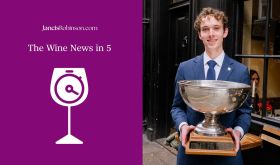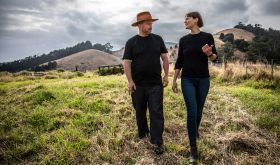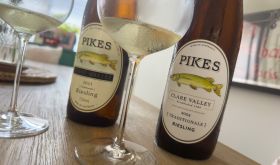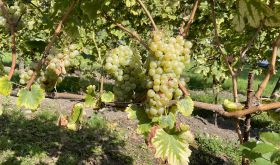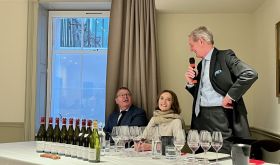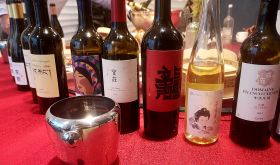Emily Campeau writes Emily Campeau previously worked as a chef and sommelier before settling on becoming a full time farmer in Franconia, Germany. Together with her husband Christoph, she cultivates vines and vegetables, and she makes wine under the name Wein Goutte. She writes a bi-monthly newsletter (in French) named Conversation Conservation, discussing the vast world of food preservation, with recipes and tips on how to capture the season at its peak.
Always cool and never boring
During the first year after my husband and I moved to Germany to pursue our wine dreams, I met tons of new people, but made exactly one friend. She is English. This friendship started in the minutes after she pulled a big winery truck into the yard. She jumped out of it fully dressed in black on a rare sunny day during the never-ending rains of the 2021 season.
We got to know each other that summer, while down on our knees, pulling overgrown weeds from between two rows of tomatoes in my garden. Trying to manage 800 square meters of vegetables was a little ambitious for the first year of our installation. I am forever grateful for the help and the company.
Conversation flowed freely and at high speed, both of us under-talked after a few months of living linguistically isolated in Franconia. We gossiped our life timelines to each other, recalling good times and hard ones, too. We talked about farming, plants, and future green dreams.
We realized quickly enough we had the same kind of dark humor, peppered by numerous cracks about our current country of residence. Making fun of German customs is excellent social glue. Why is everyone so damn serious? What's the deal with Asparagus Princesses? Can one overdose on sausage?
She helped with our harvest when she could despite her full-time job, and we helped with hers. I grilled us many chickens, wined down with excellent bottles over the warm months. By the end of the summer, my 200 tomato plants had died from late blight, because the rain did not stop, but my friendship with Sophies Evans had blossomed into a two-member sisterhood. My husband was an honorary guest, as the two of them got along splendidly.
Seasons turned and when the winter was all brown and gray, she told me she was leaving.
She was going to make natural wine in England.
*
The first time I met Sophie’s father Gareth, he said to me: “I knew that Sophie was never going to do anything boring.” Or at least that’s what I am pretty sure he said, because my French-speaking background seems to greatly alter my comprehension of British-English spoken at the speed of light.
Sophie, older of two siblings, was born and raised in the Willesden Green area of North London, close to Wembley Stadium. It was the perfect location for attending many emo concerts during her teenage years, the only one of my friend’s life choices I will ever question.
Before her entry in the wine world came a passion for clothing, and she started an apprenticeship in tailoring. Her interest lay in pattern cutting, but since no women were allowed within the terribly exclusive business of tailored suits on Savile Row in London, she bumbled around as a garment technologist for a while. In the end, an office job ordering people around instead of using her hands to do the work seemed pointless, and the clothing dream was put on pause and on she went to work her first harvest ever.
With a growing desire to be outside and an interest in organic viticulture, the next years locked in some formative experiences. She completed a degree in oenology and viticulture at Plumpton College. She spent time at Tillingham, an experimental winery in Sussex, when the project was not yet rolled out to full capacity, where she started her research for a dissertation on the use of essential oils in viticulture, and their effect on botrytis. A side job as a server at Newcomers in London sharpened her palate and her love for unconventional wines.
It was a harvest internship with an influential woman of wine that brought it all together. Sophie knew that Deirdre Heekin from La Garagista, in Vermont, was very keen on treating plants with plants, and went to spend two months there to learn about her philosophy.
Next, a fortunate meeting with Michael Völker from 2naturkinder at a natural wine fair in the Loire brought her to Franconia to learn about the planting of hybrids, known around these parts as piwis, short for pilzwiderstandsfähige Rebsorten. Many of these fungi-resistant grape varieties are also planted in England, though they are often snubbed as material for quality wine. She landed the job of cellar assistant at this winery, and since we lived 12 km from each other, our paths eventually crossed.
When someone phoned Sophie a year later to say that there was a hectare of vines in Kent that a couple was looking to rent, she didn’t hesitate long. Luck like this doesn’t come around often in England. The land where vines grow is mostly tied to a winery. Coming across a sustainably farmed vineyard to work with in her homeland was an exciting curveball.
One she took. She packed her things just in time to prune the vines in Ashford.
I kept my spirits up for my heart was full to see her embark on such a cool journey, but I was sad to see my friend go.
*
In professing my love and admiration for Sophie Evans, I need to make a pit stop of praise for a larger category of people: women winemakers.
Simply existing as a woman in the vast world of wine is already a remarkable feat. Women who choose the path of winemaking deserve a special kind of medal, inscribed with the feminist code on how to dodge the ubiquitous masculine gatekeeping of wine production. If you don’t believe me, ask one of us on any given day how often we were served a plate of ‘young lady’ at the gear store, or how many times we were asked to pass the phone to their husbands (he existing or not) when someone called with important information. The mansplaining is like a tennis ball launcher, constant and relentless.
Every day I draw energy from seeing women excel at all parts of the process. Their contribution to the dynamism of the wine world is outstanding. Some women have propelled their whole region forward. Some are amongst the best farmers in the world. A lot have well respected and sold out productions, year after year. Most of them do all of the above and are not celebrated nearly enough for it.
Sophie Evans is one of them. She is a smart and curious farmer, a talented winemaker, confident in her vision. Her first wines made in Germany and sold in the UK only evaporated in a blink.
*
The narrative around wine made in Britain reads tiresome at times, often promoted around a reproduction of Champagne’s slippery glory. The production still largely focuses on sparkling wine, and most of the acreage is planted to Champagne varieties. Producing high-quality bubbles is money, space, and time consuming. Most wineries need to have big dreams, big means, and shiny tasting rooms to sell their products.
For people of the new generation with a taste for lower interventionist styles of wines and a desire to see things on a smaller scale, there aren’t many jobs to run to fresh out of school. Finding land to rent or grapes to buy for a smaller project is quite difficult, and a lot of the talent leaves home to go do it elsewhere.
Fortunately, the times and the wine culture, they are a-changing. In her eye-opening book “The New British Wine" Abbie Moulton brushes a portrait of who’s who at the forefront of the sustainable, thoughtful, and creative side of the English wine industry, and it sounds promising. She mentions, “[...] a new wave of British wine and (a) new generation taking the expert techniques and new-found knowledge of the second wave and combining it with the experimental attitude and hybrid grapes of the first.” Many of these news projects embrace the belief that every grape has potential, and can produce amazing wine when treated with curiosity and kindness.
Despite having only one vintage in Kent under her belt, one that has not even been bottled at the moment when I am writing this, I have no doubt that Sophie Evans Wines will be an endeavor that will change the UK wine story, amongst another small handful of interesting projects throughout England. When the three wines she made in small amounts in 2022 are bottled and labeled—a Pinot Noir, a skin-fermented Pinot Gris, and a field blend—she will be the only woman in the UK bottling wine with her own name printed on the label.
For the 2023 season, an opportunity to rent an additional vineyard came forward, and she is excited by the possibility of making a little more wine. The plot is planted to Schönburger and Phoenix, two obscure grapes of German origin, and I am certain that after being vinified by this extraordinary lady, they will come out transcendent on the other side.
*
Right at the beginning of her education at Plumpton, Sophie was inspired by UK growers who embrace organic and biodynamic viticulture. Meeting Tim Philips from Charlie Herring and a biodynamic workshop at Limeburn Hill were two defining encounters. Sophie never bought the common knowledge that England’s dramatic wetness is the perfect excuse not to make an effort towards real sustainability.
Despite a challenging first season in her first vineyard in Ashford, spent spraying with a backpack until proper exhaustion, she does not question her choice. Our ideas align very much on this: cherish the land through easy or difficult times, leave it behind in the best shape possible when the time to retire comes.
Not anytime soon.
*
In October 2022, after our own harvest was pressed and fermenting, I hopped on the Eurostar and made my way to the south of England. In desperate need of a short break, I rented a flat on the seafront, and spent two Saturdays helping Sophie pick grapes for her first vintage in Ashford.
And there I saw it, the magic happening right in front of my eyes.
So many people showed up to help. Even the sun showed up. If that’s not a VIP guest in England, I don’t know who is. There were friends and family members, many people who came from London, a two-hour drive away. Someone made wood-fired paella, dogs were running around, crates of grapes were being filled, and new friendships were tied along the way.
Sophie went from one group of pickers to another, making sure everyone was having a good time, despite this day being probably one of the most stressful of her life. The sun went down behind the little shed, while the Pinot Noir was being stomped by a group of women more than willing to freeze their feet in fresh juice. It was beautiful to witness people gathering to help a first vintage come alive.
*
I have come to terms with seeing my friend less often and watching her success build from mainland Europe, where I shall remain for the time being.
We could, however, be convinced to flip things around and start a project together, in the eventuality where Paul McCartney would like two women farmers to plant a few hectares of organic vineyards on his property in East Sussex.
So Paul, if you read this, we’re in.
The photo is the author's own.






